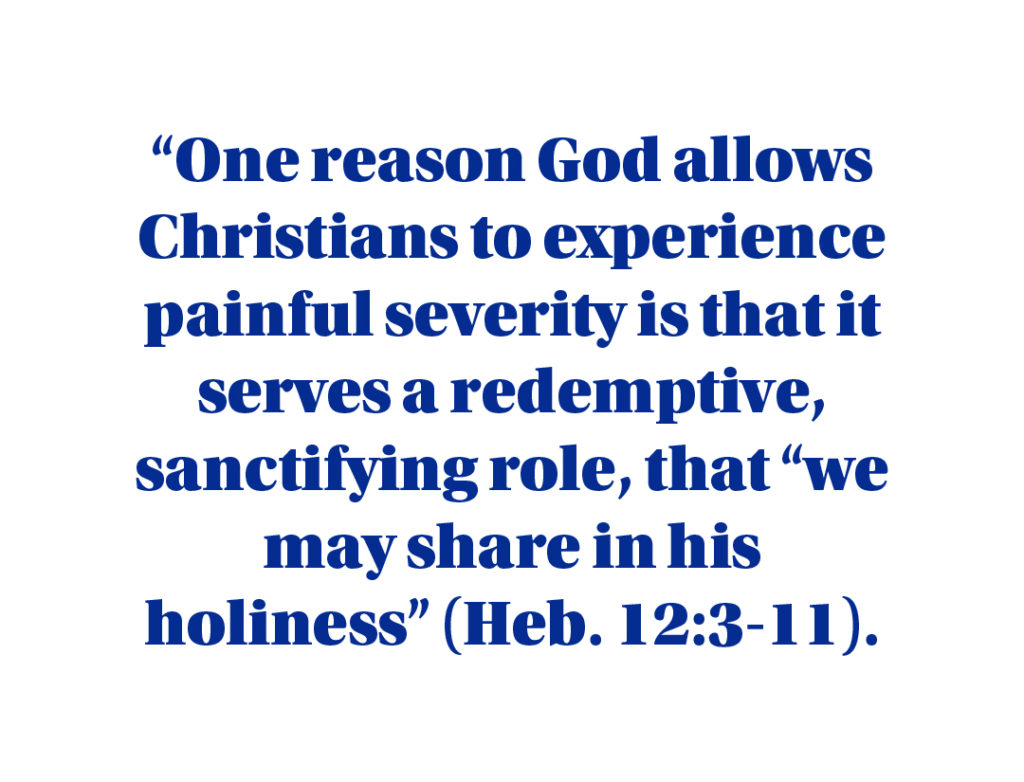Southeastern Perspectives: Dr. Ross Inman
Dr. Ross Inman | January 11, 2021

The global tide of pain, suffering and death in the wake of the COVID-19 pandemic forces us to carefully reflect on the role of disease in God’s economy this side of Eden.
It’s difficult to overstate the importance of context when it comes to the deep human impulse to understand and to make moral sense of the world. To illustrate this point, consider the following example given by philosopher Eleonore Stump[1]. Imagine a group of Martians whose sole knowledge of human life on earth stems from video footage of hospital medical procedures. These Martians observe doctors amputating limbs, cutting out human organs and administering drugs that cause grave pain and suffering. They witness patient after patient groaning in severe pain, along with the accompanying grief, anxiety and tears of their loved ones. The Martians will no doubt be filled with moral indignation at the medical doctors who bring about or allow such horrendous pain and suffering to continue.
Any hint that the doctors are actually caring for their patients will be met with scorn and moral outrage. Of course, the Martians respond this way out of a failure to attend to the wider context concerning the human condition. They are unaware that the patients arrive at the hospital with pre-existing conditions that require serious, life-saving medical attention, or that without the relevant medical procedures the patients will likely die. Nor do they know that the vast majority of the patients recover from these procedures and go on to live full, healthy lives outside of the hospital.
 Likewise, if we fail to grasp the overarching theological context of the drama of human sin and redemption, we too will find ourselves responding with moral confusion, bitterness and scorn at a God who continues to allow creation to be vandalized by disease, sickness and death. Romans 8:18-25 offers a profound window into an overarching theological context by which we can interpret the tide of suffering brought on by the likes of COVID-19:
Likewise, if we fail to grasp the overarching theological context of the drama of human sin and redemption, we too will find ourselves responding with moral confusion, bitterness and scorn at a God who continues to allow creation to be vandalized by disease, sickness and death. Romans 8:18-25 offers a profound window into an overarching theological context by which we can interpret the tide of suffering brought on by the likes of COVID-19:
“For I consider that the sufferings of this present time are not worth comparing with the glory that is to be revealed to us. For the creation waits with eager longing for the revealing of the sons of God. For the creation was subjected to futility, not willingly, but because of him who subjected it, in hope that the creation itself will be set free from its bondage to corruption and obtain the freedom of the glory of the children of God. For we know that the whole creation has been groaning together in the pains of childbirth until now. And not only creation, but we ourselves, who have the firstfruits of the Spirit, groan inwardly as we wait eagerly for adoption as sons, the redemption of our bodies.”
The text naturally points backwards to God’s curse of the natural order due to human sin (Gen. 3:14-19), and forward to the final removal of the creational curse in Revelation 22 (22:3).
As a result of the sin of the first human pair, the entire created order is not the way it’s supposed to be. All subsequent human beings (save Christ) inherit a will that is radically diseased and turned inward away from God, their greatest possible good. The tragic consequences of original sin include our propensity to hide from God and to cover ourselves from the gaze of others (Gen. 3:7-8). These relational obstacles to loving fellowship with God and others are indeed severe and (eternally) life-threatening; they require serious, life-saving attention without which we will perish in a state of everlasting separation from God.
Romans 8:18-25 forcefully challenges our expectations as to how a loving God would relate to us in our morally ruined condition. Given the urgency of our life-threatening condition, God’s redemptive posture towards humans is often quite severe (Rom. 11:22), in the same way that a doctor’s life-saving actions toward a dying patient are often severe. In his manifold wisdom, God chooses not to insulate us from the most severe aspects of life such as dementia, cancer or a global pandemic. Contrary to our expectations, God responds to our self-ruin by multiplying pain and hardship (Gen. 3:14-19).
How might the subjection of creation to futility and the multiplication of pain and hardship serve God’s redemptive purposes for wayward creatures? For all we know, allowing those apart from Christ to experience the fragility and severity of human disease in this way may be the most powerful means at God’s disposal to shake them out of their deep-seated self-reliance and to cultivate a greater openness to receive the lasting treatment for their life-threatening condition. One reason God allows Christians to experience painful severity is that it serves a redemptive, sanctifying role, that “we may share his holiness” (Heb. 12:3-11).
All of God’s wayward creatures should expect God’s redemptive love to be severe, to actively oppose all relational obstacles that hinder deeper loving union with God and others. Romans 8:18-25 reminds us that God is not interested in fabricating a cosmic playpen for our comfort, replete with foam padding to protect us from the jagged edges of life this side of Eden. The wider theological lens of Romans 8:18-25 gives us the full context and helps us properly interpret the severity of human disease and the loving character of God in allowing it to continue.
For further reading:
Brian Han Gregg, “What Does the Bible Say About Suffering?”
Eleonore Stump, “Wandering in Darkness: Narrative and the Problem of Suffering”
Paul Moser, “The Severity of God”
[1] Eleonore Stump, Wandering in Darkness: Narrative and the Problem of Suffering
(Oxford University Press, 2010), pp. 17-18.

Dr. Ross Inman serves as Associate Professor of Philosophy at Southeastern.
This article originally appeared in the fall issue of Southeastern Magazine. To read more stories like this, visit sebts.edu/magazine.